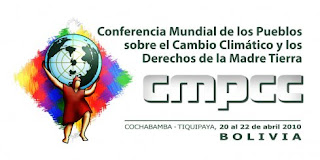 Canadian activist and author of The Shock Doctrine - The Rise of Disaster Capitalism, Naomi Klein, was asked by Bolivia TV for her views on the climate change disaster facing the planet last night. Klein, who was voted 11th in a poll of the world's top intellectuals, is currently taking part in the World People's Conference on Climate Change and the Rights of Mother Earth in Cochabamba, Bolivia. The conference was organised by Bolivian president, Evo Morales, after world leaders' monumental failure to reach an agreement on global warming in Copenhagen last year. Unwilling to leave the fate of the planet in the hands of politicians, the World People's Conference is aiming to give a voice to grass roots activists and populations effected by climate change worldwide.
Canadian activist and author of The Shock Doctrine - The Rise of Disaster Capitalism, Naomi Klein, was asked by Bolivia TV for her views on the climate change disaster facing the planet last night. Klein, who was voted 11th in a poll of the world's top intellectuals, is currently taking part in the World People's Conference on Climate Change and the Rights of Mother Earth in Cochabamba, Bolivia. The conference was organised by Bolivian president, Evo Morales, after world leaders' monumental failure to reach an agreement on global warming in Copenhagen last year. Unwilling to leave the fate of the planet in the hands of politicians, the World People's Conference is aiming to give a voice to grass roots activists and populations effected by climate change worldwide. In a relatively short but info packed interview, Klein commented on the following topics:
THE FAILURE OF COPENHAGEN
Klein put the blame for the summit's failure squarely on the shoulders of Barack Obama who, soon after receiving his Nobel Peace Prize award, came to the table at Copenhagen "only to overturn it". Rather than embracing the democratic principles he so enjoys preaching, he tried to get away with doing a closed door "global" deal with only 5 other countries at the table. Klein characterised this deal as a "Devil's agreement". The terms of the US agreement failed to reduce carbon emissions to levels that would stop global warming, allowing global destruction such as the disappearance of Bolivia's glaciers to continue unabated. To recompense affected countries, a "bribe" would be paid to force acceptance and adaptation to the devastating environmental changes. Unsurprisingly, the deal was rejected by the vast majority of nations not party to the secretive talks.
CIA & PENTAGON PAPERS
Klein then went on to talk about the increasing concern of the US government, particularly the military, with regard to the potential consequences of climate change on US immigration and general world stability. CIA and Pentagon papers, Klein said, alluded to fears of a flood of immigrants to the US, a consequence of displacement caused by the effects of global warming. The US reaction to this "threat" would be to turn the country into a fortress, Klein added. The number of wars around the world would also rise as the US and other powerful nations competed for the planet's increasingly scarce resources.
EXPECTATIONS FOR THE WORLD PEOPLE'S CONFERENCE
Climate Debt
Klein fully supported affected countries' claims to compensation from the world's biggest carbon polluters. The idea was simple, if you break something you should pay for it. However, she added that compensation was not enough, polluting countries had to reduce their emissions as well.
 Climate Tribunal
Climate TribunalShe then highlighted the importance of enforcement of climate agreements as a key topic being debated at the conference by citing her own home country as an example. Canada, she said, was a "climate criminal". Since signing the Kyoto Agreement, its emissions had increased by 35%. Without a climate tribunal with the power to enforce climate regulation, the whole exercise was futile.
Protection of "whole ecosystem"
Klein concluded that any successful climate policy must protect the complete ecosystem of the planet. Humans should also be considered a "natural" part of the ecosystem.
UPADATE:

